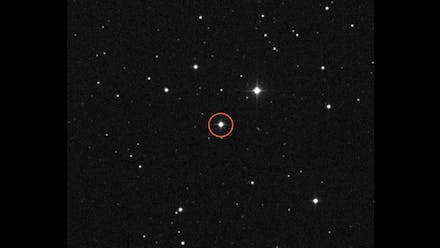Starshot: Stephen Hawking's $100 Million Project Will Send Probes to Alpha Centauri

On April 12 famous astrophysicist Stephen Hawking and billionaire entrepreneur and investor Yuri Milner announced an ambitious plan to send a probe to our nearest star, Alpha Centauri, within a generation.
Alpha Centauri is over 4 light-years away, or about 25.6 trillion miles away, but Milner is investing $100 million in a research project called "Starshot" to send a probe to Alpha Centauri, and he thinks we could do it in 20 years.
"It is time to launch the next great leap in human history," Milner said at the press conference.
Starshot will seek to pack all the space-probe components into a fleet of teeny-tiny nano-spacecraft that we could accelerate to great speeds.
Each tiny craft will have a light sail that could hitch a ride on powerful laser pulses shot from Earth. Each pulse would give the nanocraft a boost. Eventually, they could accelerate to relativistic speeds inside the vacuum of space.
The fleet of spacecraft won't have any means to slow down, though. It'll need to do a fly-by of Alpha Centauri, snapping some photos and taking some data like probing molecules and measuring magnetic fields as it whizzes past.
"There are many challenges, but we don't see any show stoppers based on fundamental physics principles," Avi Loeb, an astronomer at Harvard who is involved with the mission, said at the press conference.
This is a truly revolutionary means of propulsion, which Hawking said we desperately need.
"Without new methods of propulsion, we simply cannot get very far unless we are prepared to spend thousands of years in flight," Hawking said.
The date of the announcement is significant: April 12 is the 55th anniversary of the first-ever human spaceflight by cosmonaut Yuri Gagarin in 1961. We've come along way since then, Hawking said, and it's time for humans to take the next step in space exploration.
"What makes us unique is transcending our limits," Hawking said at the press conference. "We can launch a mission to Alpha Centauri within a generation."
So why should we bother traveling to another star? Hawking had a great two-part reason.
"Firstly, because there are not greater heights to aspire to than the stars," Hawking said. "Secondly, it's not a good idea to keep all our eggs in one fragile basket."
Hawking is referring to the possibility of the Earth getting destroyed by something like a wayward asteroid, supernova explosion or climate change.
Former astronaut Mae Jemison said this isn't just about space exploration.
"We have to do this in order to make life here on Earth better as well," Jemison said.
Last year, Hawking and Milner announced a $100 million program that would use a system of radio telescopes to search for signs of life. The 10-year project, called Breakthrough Listen, is the largest hunt for extraterrestrial life of its kind. It will scan 10 times more of the skies at 50 times the sensitivity of previous search-for-extraterrestrial-intelligence (known as SETI) missions.